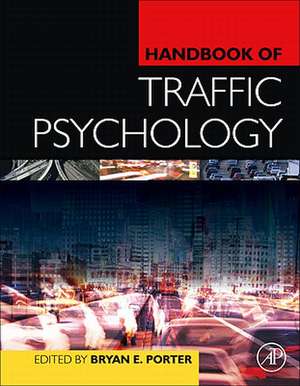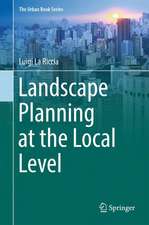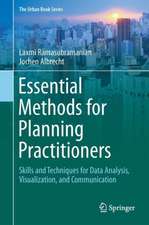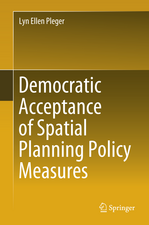Handbook of Traffic Psychology
Editat de Bryan E. Porteren Limba Engleză Hardback – 23 aug 2011
- Focuses specifically on traffic, as opposed to transport
- Covers all key areas of research in traffic psychology including theory, applications, methodology and analyses, variables that affect traffic, driver problem behaviors, and countermeasures to reduce the risk of variables and behavior
- Contents include how to conduct traffic research and how to analyze data
- Contributors come from more than 10 countries, including US, UK, Japan, Netherlands, Ireland, Switzerland, Mexico, Australia, Canada, Turkey, France, Finland, Norway, Israel, and South Africa
Preț: 745.66 lei
Preț vechi: 1080.12 lei
-31% Nou
Puncte Express: 1118
Preț estimativ în valută:
142.73€ • 155.09$ • 119.97£
142.73€ • 155.09$ • 119.97£
Carte tipărită la comandă
Livrare economică 14-28 aprilie
Preluare comenzi: 021 569.72.76
Specificații
ISBN-13: 9780123819840
ISBN-10: 0123819849
Pagini: 536
Dimensiuni: 216 x 276 x 25 mm
Greutate: 1.43 kg
Editura: Elsevier
ISBN-10: 0123819849
Pagini: 536
Dimensiuni: 216 x 276 x 25 mm
Greutate: 1.43 kg
Editura: Elsevier
Public țintă
Libraries, researchers, and applied practitioners in traffic psychology.Cuprins
Part One: Theories, Concepts, and Methods
Chapter 1 - How Many E's in Road Safety?
Chapter 2 - Driver Control Theory
Chapter 3 - Case-Control Studies in Traffic Psychology
Chapter 4 - Self-Report Instruments and Methods
Chapter 5 - Naturalistic Observational Field Techniques for Traffic Psychology Research
Chapter 6 - Naturalistic Driving Studies and Data Coding and Analysis Techniques
Chapter 7 - Driving Simulators as Research Tools in Traffic Psychology
Chapter 8 - Crash Data Sets and Analysis
Part Two: Key Variables to Understand in Traffic Psychology
Chapter 9 - Neuroscience and Young Drivers
Chapter 10 - Neuroscience and Older Drivers
Chapter 11 - Visual Attention While Driving
Chapter 12 - Social, Personality, and Affective Constructs in Driving
Chapter 13 - Mental Health and Driving
Chapter 14 - Person and Environment: Traffic Culture
Chapter 15 - Human Factors and Ergonomics
Part Three: Key Problem Behaviors
Chapter 16 - Factors Influencing Safety Belt Use
Chapter 17 - Alcohol-Impaired Driving
Chapter 18 - Speed(ing)
Chapter 19 - Running Traffic Controls
Chapter 20 - Driver Distraction
Chapter 21 - Driver Fatigue
Part Four: Vulnerable and Problem Road Users
Chapter 22 - Young Children and "Tweens"
Chapter 23 - Young Drivers
Chapter 24 - Older Drivers
Chapter 25 - Pedestrians
Chapter 26 - Bicyclists
Chapter 27 - Motorcyclists
Chapter 28 - Professional Drivers
Part Five: Major Countermeasures to Reduce Risk
Chapter 29 - Driver Education and Training
Chapter 30 - Persuasion and Motivational Messaging
Chapter 31 - Enforcement
Part Six: Interdisciplinary Issues
Chapter 32 - The Intersection of Road Traffic Safety and Public Health
Chapter 33 - Public Policy
Chapter 34 - Travel Mode Choice
Chapter 35 - Road Use Behavior in Sub-Saharan Africa
Chapter 1 - How Many E's in Road Safety?
Chapter 2 - Driver Control Theory
Chapter 3 - Case-Control Studies in Traffic Psychology
Chapter 4 - Self-Report Instruments and Methods
Chapter 5 - Naturalistic Observational Field Techniques for Traffic Psychology Research
Chapter 6 - Naturalistic Driving Studies and Data Coding and Analysis Techniques
Chapter 7 - Driving Simulators as Research Tools in Traffic Psychology
Chapter 8 - Crash Data Sets and Analysis
Part Two: Key Variables to Understand in Traffic Psychology
Chapter 9 - Neuroscience and Young Drivers
Chapter 10 - Neuroscience and Older Drivers
Chapter 11 - Visual Attention While Driving
Chapter 12 - Social, Personality, and Affective Constructs in Driving
Chapter 13 - Mental Health and Driving
Chapter 14 - Person and Environment: Traffic Culture
Chapter 15 - Human Factors and Ergonomics
Part Three: Key Problem Behaviors
Chapter 16 - Factors Influencing Safety Belt Use
Chapter 17 - Alcohol-Impaired Driving
Chapter 18 - Speed(ing)
Chapter 19 - Running Traffic Controls
Chapter 20 - Driver Distraction
Chapter 21 - Driver Fatigue
Part Four: Vulnerable and Problem Road Users
Chapter 22 - Young Children and "Tweens"
Chapter 23 - Young Drivers
Chapter 24 - Older Drivers
Chapter 25 - Pedestrians
Chapter 26 - Bicyclists
Chapter 27 - Motorcyclists
Chapter 28 - Professional Drivers
Part Five: Major Countermeasures to Reduce Risk
Chapter 29 - Driver Education and Training
Chapter 30 - Persuasion and Motivational Messaging
Chapter 31 - Enforcement
Part Six: Interdisciplinary Issues
Chapter 32 - The Intersection of Road Traffic Safety and Public Health
Chapter 33 - Public Policy
Chapter 34 - Travel Mode Choice
Chapter 35 - Road Use Behavior in Sub-Saharan Africa
Recenzii
"Overall, I was impressed by the breadth of coverage of Handbook of Traffic Psychology as well as the inclusion and representation of several international sources. Although there are some chapters that are less comprehensive in scope, they all contribute to the overall effort. The editor should be commended for gathering an impressive list of authors who, in my opinion, adequately fulfilled his ambitious goals for the handbook." --PsycCritiques June 27, 2012, Vol. 57, Release 25, Article 8




























